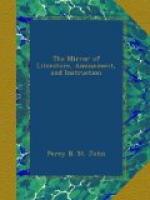One of the most remarkable echoes of which we have read is that which Dr. Birch describes as existing at Roseneath, in Argyllshire. When a person at a proper distance played eight or ten notes on a trumpet, they were correctly repeated, but a third lower; after a short silence, another repetition was heard in a yet lower tone, and alter another short interval, they were repeated a third time in a tone lower still.
We extract the following account of two very interesting echoes from Mr. Herschell’s work:—
“In the cathedral of Girgenti, in Sicily, the slightest whisper is borne with perfect distinctness from the great western door to the cornice behind the high altar, a distance of 250 feet. By a most unlucky coincidence, the precise focus of divergence at the former station was chosen for the place of the confessional. Secrets never intended for the public ear thus became known, to the dismay of the confessors and the scandal of the people, by the resort of the curious to the opposite point (which seems to have been discovered accidentally), till at length one listener, having had his curiosity somewhat overgratified by hearing his wife’s avowal of her own infidelity, this tell-tale peculiarity became generally known, and the confessional was removed.[2]
“Beneath the Suspension Bridge across the Menai Strait in Wales, close to one of the main piers, is a remarkably fine echo. The sound of a blow on the pier with a hammer is returned in succession from each of the cross-beams which support the road-way, and from the opposite pier at a distance of 576 feet; and in addition to this, the sound is many times repeated between the water and the road-way. The effect is a series of sounds which may be thus described:—The first return is sharp and strong from the road-way overhead; the rattling which succeeds dies away rapidly, but the single repercussion from the opposite pier is very strong, and is succeeded by a faint palpitation, repeating the sound at the rate of twenty-eight times in five seconds, and which therefore corresponds to a distance of 184 feet, or very nearly the double interval from the road-way to the water. Thus it appears, that in the repercussion between the water and road-way, that from the latter only affects the ear, the line drawn from the auditor to the water being too oblique for the sound to diverge sufficiently in that direction.—Another peculiarity deserves especial notice, namely, that the echo from the opposite pier is best heard when the auditor stands precisely opposite to the middle of the breadth of the pier, and strikes just on that point. As it deviates to one or the other side, the return is proportionably fainter, and is scarcely heard by him when his station is a little beyond the extreme edge of the pier, though another person, stationed (on the same side of the water) at an equal distance from the central point, so as to have the pier between them, hears it well.”




